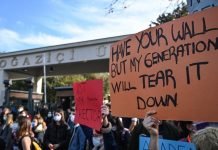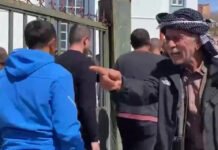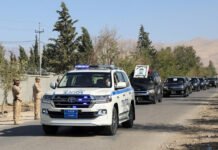The Turkish government issued detention warrants for 145 people and detained 80 across Turkey on Tuesday as part of its massive post-coup witch hunt targeting alleged members of the Gülen movement.
The Çanakkale Chief Public Prosecutor’s Office on Tuesday issued detention warrants for 22 military officers over their alleged links to the Gülen movement. The military officers, 21 of whom are on active duty, have been accused of communicating with other alleged members of the movement.
The İzmir Chief Public Prosecutor’s Office issued detention warrants for 25 people, including doctors, military officers, teachers and staff from the Scientific and Technological Research Council of Turkey (TÜBİTAK) on Tuesday over their alleged links to the Gülen movement. Police detained 12 of them during raids in 16 provinces across Turkey.
The Kocaeli Chief Public Prosecutor’s Office issued detention warrants for 24 former and serving military officers, including 10 on active duty, on Tuesday in nine provinces over their alleged links to the Gülen movement. Police launched simultaneous operations in Kocaeli, İstanbul, Ankara, Muğla, Yalova, Çanakkale, Balıkesir, Erzincan and Şırnak provinces to detain the military personnel being sought.
The Ankara Chief Public Prosecutor’s Office issued detention warrants for seven people on Tuesday over their alleged use of the ByLock mobile phone messaging application. Police reportedly detained four of them in Ankara and İstanbul.
Turkish authorities believe ByLock is a communication tool among alleged followers of the Gülen movement. Tens of thousands of people, including civil servants, police officers, soldiers, businessmen, and even housewives have either been dismissed or arrested for allegedly using ByLock since a controversial coup attempt on July 15, 2016.
The UN Human Rights Council’s Working Group on Arbitrary Detention (UN/WGAD) stated in a recently released assessment that detention, arrest and conviction in Turkey based on the alleged use of ByLock is a violation of Articles 19, 21 and 22 of the International Covenant on Civil and Political Rights (ICCPR).
Meanwhile, following the issuance of detention warrants by the Konya Chief Public Prosecutor’s Office for 17 people on Tuesday over their alleged use of ByLock, police detained 12 suspects in Konya.
Additionally, three people were detained in an operation in central Eskişehir province on Tuesday over links to the movement. Another seven people were detained in eastern Adıyaman province, all accused of using ByLock. In a Malatya-based investigation carried out in three provinces, five people including a lawyer were detained for allegedly using ByLock.
Police also detained 28 people in an Adana-based investigation into alleged members of the Gülen movement across four provinces. Two other people were arrested by police on Tuesday in an operation launched in the Black Sea province of Zonguldak against alleged members of the movement.
Also on Tuesday, police detained seven people in the Çarşamba district of Samsun province, Ankara and İstanbul over their alleged links to the Gülen movement as part of a Samsun-based investigation.
The detainees are reportedly former employees of educational and civil society institutions that were closed down by the government under a state of emergency declared in the aftermath of a controversial coup attempt on July 15, 2016. The detainees were accused of using ByLock and depositing money in their personal accounts at private lender Bank Asya, which was also closed by the government over its affiliation with the movement.
Hundreds of thousands of people in Turkey have been the subject of legal proceedings in the last two years on charges of membership in the Gülen movement since a coup attempt on July 15, 2016, a Turkish Justice Ministry official told a symposium on July 19, 2018.
“Legal proceedings have been carried out against 445,000 members of this organization,” Turkey’s pro-government Islamist news agency İLKHA quoted Turkish Justice Ministry Deputy Undersecretary Ömer Faruk Aydıner as saying.
Turkey survived a controversial military coup attempt on July 15, 2016, that killed 249 people. Immediately after the putsch, the Justice and Development Party (AKP) government along with President Recep Tayyip Erdoğan pinned the blame on the Gülen movement.
Fethullah Gülen, who inspired the movement, strongly denied having any role in the failed coup and called for an international investigation into it, but President Erdoğan — calling the coup attempt “a gift from God” — and the government initiated a widespread purge aimed at cleansing sympathizers of the movement from within state institutions, dehumanizing its popular figures and putting them in custody.
Turkey has suspended or dismissed about 170,000 judges, teachers, police and civil servants since July 15, 2016. On December 13, 2017, the Justice Ministry announced that 169,013 people have been the subject of legal proceedings on coup charges since the failed coup.
Turkish Interior Minister Süleyman Soylu announced on April 18, 2018, that the Turkish government had jailed 77,081 people between July 15, 2016, and April 11, 2018, over alleged links to the Gülen movement.
















